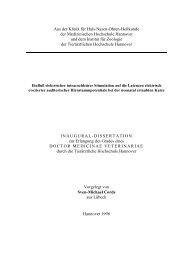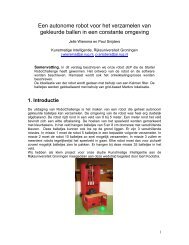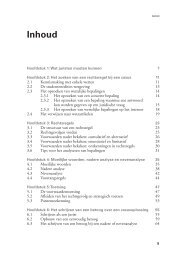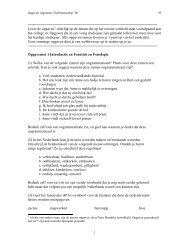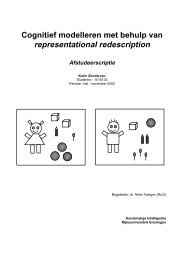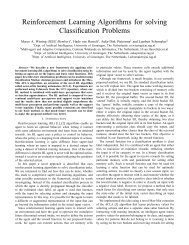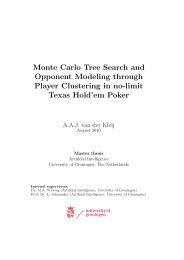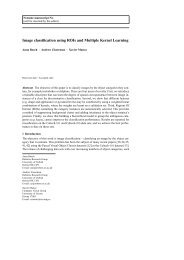Presuppositions in Spoken Discourse
Presuppositions in Spoken Discourse
Presuppositions in Spoken Discourse
You also want an ePaper? Increase the reach of your titles
YUMPU automatically turns print PDFs into web optimized ePapers that Google loves.
Chapter 4<br />
Speaker A How‘s th<strong>in</strong>gs -<br />
Speaker c Th<strong>in</strong>gs is OK - a bit hectic -<br />
Speaker A Yes.<br />
Speaker c I don‘t know we just don‘t seem to [@] get anywhere f<strong>in</strong>ish anyth<strong>in</strong>g.<br />
Speaker A [m] - -<br />
Speaker c It seems to be a totally cont<strong>in</strong>uous and you know with this - great<br />
junket<strong>in</strong>g com<strong>in</strong>g up <strong>in</strong> September.<br />
Speaker c +{I} know+, +we haven‘t+ done anyth<strong>in</strong>g about it **.<br />
Speaker A *Are you do<strong>in</strong>g [lot] you‘re not* do<strong>in</strong>g lots of arrang<strong>in</strong>gs and th<strong>in</strong>gs - -?<br />
Speaker c Well <strong>in</strong> pr<strong>in</strong>ciple yes, I don‘t feel that we‘ve actually done very much.<br />
Speaker A *Well it‘s too early*.<br />
Speaker B *What‘s happen<strong>in</strong>g <strong>in</strong> September*.|<br />
Speaker c +Well+.<br />
Speaker A +They‘re gett<strong>in</strong>g+ married.<br />
Speaker c We‘re be<strong>in</strong>g married.<br />
Speaker B Good gracious - -.<br />
Speaker d ( . laughs).|<br />
Speaker A But surely it‘s {too early}, to start gett<strong>in</strong>g ready now, or maybe it‘s isn‘t.<br />
F<strong>in</strong>ally, an example of the trigger too is shown below. As expla<strong>in</strong>ed <strong>in</strong> chapter 2, too<br />
is generally treated as trigger<strong>in</strong>g the presupposition of an event or state of a type<br />
similar to one <strong>in</strong> its scope called the theme, with a focus element that is contrasted<br />
with another parallel argument to the argument <strong>in</strong> the utterance <strong>in</strong> which the too<br />
occurs. In the example below the speakers are choos<strong>in</strong>g pa<strong>in</strong>t<strong>in</strong>gs to decorate their<br />
offices (as far as I can tell). The second speaker uses the too to highlight that she<br />
also would f<strong>in</strong>d the picture they are currently exam<strong>in</strong><strong>in</strong>g difficult to look at because<br />
her eyes would go out of focus, just as Speaker C has commented the theme is the<br />
pa<strong>in</strong>t<strong>in</strong>g unfocus<strong>in</strong>g someone and the focus is Speaker A <strong>in</strong> the trigger<strong>in</strong>g<br />
expression and Speaker C <strong>in</strong> the antecedental expression. Note that both l<strong>in</strong>guistic<br />
expressions share an argument, the that referred to by Speaker C is the same<br />
pa<strong>in</strong>t<strong>in</strong>g that is anaphorically referred to by the it <strong>in</strong> Speaker A’s statement. Note<br />
also that the utterance where the presupposition triggered by too is made, is clearly a<br />
response to the comment made by Speaker C, where the antecedent was found,<br />
and certa<strong>in</strong>ly helps support an <strong>in</strong>terpretation that this utterance is where the<br />
antecedent <strong>in</strong>formation derived from.<br />
(10) too, triggered p: (this picture) would unfocus someone else besides Speaker A<br />
(1-8 671)<br />
Speaker C It might be astigmatism, but I, I dislike l<strong>in</strong>es which make my eyes<br />
go out of focus and I go out of focus very badly on that.<br />
Speaker A Yes, I know what you mean, yes, it would unfocus me too. No, I<br />
wouldn’t be able to have that.<br />
Speaker C It actually makes me feel rather nervous, you know.<br />
As seen by the frequency data almost every example with too could be bound with<br />
someth<strong>in</strong>g <strong>in</strong> the context, though the strength of the perceived relationship and the<br />
clarity of this relationship differs. This may have someth<strong>in</strong>g to do with what too<br />
72



